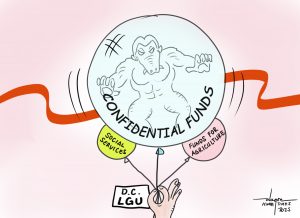Officials of the Kapa-Community Ministry International, Inc. and its allied organizations have been giving police and business regulatory authorities a run-around. This after a good number of people have come out to complain to the police that they have been gypped of huge sums of money by Kapa agents.
The victim claimants say they were enticed to invest money due to promise of high returns.
The investor-victims claim they feel more convinced of the enticement because the businesses of the organizations supposedly affiliated with the group are tied up with religious activities.
Moreover, the declared primary intention is all that the people are aspiring for — to be rich.
Unfortunately, it turned out that the scam agents were targeting the most vulnerable sector of the population as their victims — the hapless poor who have accumulated some savings from their hard-earned money. Some in fact dispose of whatever property they have, or borrow money from lending institutions or well-off relatives just to pursue the promised exceedingly high returns on their investment that are due them every month. Kapa was even reported to have advanced the high interest by issuing post-dated checks covering the investors’ monthly take.
This scheme appears the most convincing since in the case of those early “investors” their post-dated checks were made good. Thus, they too became new sets of enticers. And what the Kapa agents have added to claim legitimacy is its alleged name dropping of leading political personalities like Mayor Sara Duterte-Carpio, resigned Vice Mayor Pulong Duterte, and even the President.
Because of this guts of Kapa officials and agents to namedrop, the Mayor issued months back a stern warning to the organization and its affiliates to stop their unauthorized activities much more the use of the mayor’s, her brother’s and her father’s names in their illegal operations.
The growing number of complainants eventually led the Securities and Exchange Commission (SEC) to issue in 2016 a temporary Cease and Desist Order (CDO) to Kapa from selling securities in the form of investment contracts and in the guise of donations to the religious ministry.
But, according to the SEC, this has been ignored by the organization because it has not filed the appropriate pleading within the prescribed period. Thus, last February 14, 2019 the CDO of the SEC became final.
What is intriguing in this seemingly open disregard of SEC regulation and the Davao City mayor’s warning is the guts of Kapa officials and its agents to continue with their activities as if they are beyond reach of the regulatory and law enforcement authorities. Are there influential people protecting them from the arms of the law? Or, are we Filipinos, in our own desire to get rich quickly, or in our own greedy ambition, allowing ourselves to be so vulnerable to scams all over and are even willing to be scammers in exchange for commissions or whatever emoluments at the expense of our hapless fellowmen?
Yes, from the accounts of the victims, the promised return on investment is too good an invitation to unload everything they have and entrust the same to the care of the glib-tongued Kapa agents.
Unfortunately, the very thing forgotten here is the dictum that “If it’s too good to be true, then it is not true.”
Oftentimes we put the blame of our misfortunes to other people, but we forget that most of the times we have ourselves primarily to blame.
**************************
No less than the Secretary of the Department of Agriculture (DA) is saying that some big businessmen engaged in the wholesale trading of onions are manipulating the prices at the farm level in some Luzon provinces. This after onion farmers were complaining that they have to dispose of their onions to as low as P15 per kilo due to alleged oversupply.
But according to DA Secretary Emmanuel Pinol the big traders are controlling the ownership and operations of warehouses and other post-harvest facilities. As a result they can close the warehouses at any time they want and advise the onion farmers they will not be buying their produce because they have no storage facilities.
This has made farmers decide to dispose of their onions to a much lower price to — who else but the middlemen let loose by the big-time traders themselves.
It is apparent that the DA top boss is well aware of the problem and knows who the culprits are. Why he is not doing what is necessary and still have to solicit the help of the Philippine Competition Commission (PCC) to intervene, we can only surmise.And we also believe that the crisis in the onion production due to exceedingly low farm gate prices has long been the situation of the coconut indusrty especially in Mindanao. In the Davao Region coconut traders are buying whole coconut fruit in the farm as low as P3.50 to P3.75 per kilo as of the last time our neighbor farmers harvested their coconut.
But apparently, the Philippine Coconut Authority (PCA), the agency tasked by government to oversee the country’s coconut industry, is sleeping on its job. We have yet to hear of any intervention by the PCA to help coconut farmers recoup their expenses in maintaining their coconut farms.
We do not know if the PCA board is still meeting to share what the members have observed in the coconut industry. Or, are we correct in our suspicion that they are just cooling themselves in their air-conditioned offices while waiting to collect their monthly pay and allowances?


